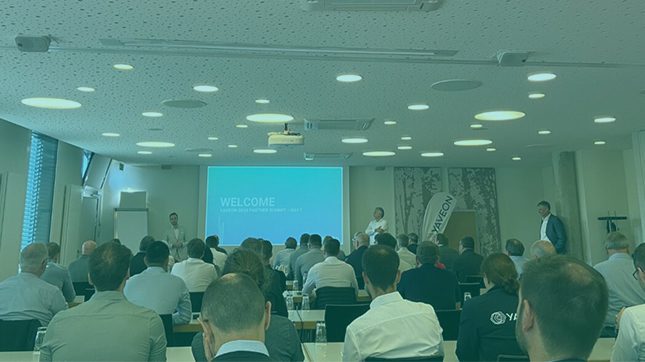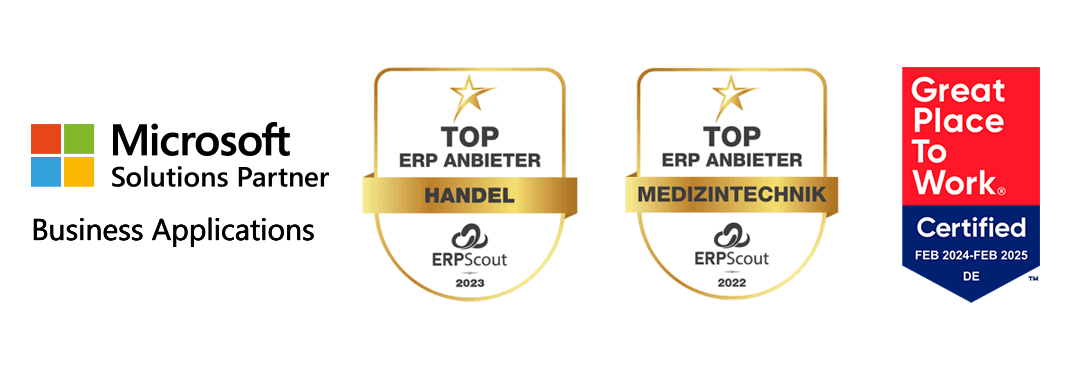Digitalization in the
Chemical Industry
Which current trends are shaping digitalization in the chemical industry, where are the stumbling blocks and where can software provide support?

14. September 2023
Digitalization is one of the most exciting and challenging topics in business development today—not least in the chemical industry. The need for digitalization was always apparent, but the COVID-19 pandemic heightened the urgency dramatically. Companies are finding it difficult to operate as normal due to external influences such as the geopolitical situation or high inflation.
The result is a slowing of growth, and reduced profits. In light of these triggers, companies have become more aware of the importance of digitalization in the chemical industry, and have begun taking steps toward change.
Software, robots, and digital twins – digitalization in the chemical industry is on the rise. However, these are just a few examples of how the chemical industry is moving forward. The potential is far greater. What digital mechanisms are chemical companies already using and where are there further opportunities?
The chemical industry - The journey to Chemistry 5.0
Industry 4.0. Not new, but tried and tested, and suitable for everyday work. With this, we mean the use of automation and technology that eases the workload of companies. Industry 5.0 goes one step further. The concept builds on the technology of Industry 4.0, as it optimizes the cooperation between humans and machines. Businesses are using advanced technologies, artificial intelligence, and robotics to improve efficiency, and meet future challenges.
The chemical industry can also benefit from this development. Originally intended to optimize and digitalize processes, AI technologies and robots are now augmenting the day-to-day tasks in numerous companies in the chemical industry. And this trend is increasing. So, is Chemistry 4.0 becoming Chemistry 5.0? We can clearly identify a trend to integrate these new tools into daily processes. We take a look at the technology in the chemical industry that is particularly helpful, from digital twins, via AI, to predictive maintenance.
Digital Transformation in chemical research and development
One area that is particularly relevant for chemical companies is research and development. And that’s why it’s an ideal area to boost digital transformation. Many companies are working on the following applications of technology:
Digital Twin
A digital twin is the virtual representation of a process or product. Usually consisting of models, simulators, and algorithms, it bridges the gap from the virtual to the real world. For the chemical industry, this means that a digital twin recreates real-world conditions, and their impact, to help detect changes on physical objects. Rather than testing on an actual asset, the use of a digital twin saves time and money. In addition, it prevents financial damage that might arise when a real-life experiment goes wrong. This is a helpful tool, particularly in R&D, to drive the profitability of a project.
Document Management Systems
Companies in the chemical industry are subject to strict regulations in research and development. They must document a diverse range of processes and data in detail. Traditionally, the burden of this paperwork makes it incredibly time-consuming, not to mention prone to errors. If a figure is written indistinctly, it might be misread by the next employee in charge. Another con is that paper takes up a lot of space. Folders and stacks of paper quickly pile up in offices and warehouses. To make it easier to meet the required documentation requirements, many companies in the chemical industry use digital solutions such as document management systems. This enables the digital management of the large number of documents and data generated during the research stage.
Networking
The development of a new product generally involves several departments and employees. However, departments and staff may be located in diverse locations, particularly in larger companies. Digital transformation provides virtual networks to enable data access and exchange between colleagues, which increases the efficiency of R&D projects.
Big Data
In every sector, the amount of data that needs to be processed is increasing. We are talking about big data. Digital tools are required to make sense of all this data, and so companies in the chemical industry need effective digital solutions. This provides an optimal foundation for the targeted development of innovative products.
Artificial Intelligence
Even before Chat GPT, artificial intelligence was a favored solution in many sectors. Since its mass adoption, Chat GPT is now accessible to everyone. AI offers enormous potential for R&D departments of chemical companies, as it enables automated analyses and interpretations of test series.
Machine Learning
AI also includes machine learning tools. In addition to undertaking stored processes, these tools can learn new ones. Building on this foundation, these tools can support the company’s R&D activities, for example, by creating proposals for the creation of new recipes.
Internet of Things (IoT)
The Internet of Things connects the virtual world to the real world. A well-known example is the ‘smart fridge,’ which uses sensors to detect when you are out of milk and automatically orders a new carton via the internet. In the chemical industry, the IoT enables the digital reporting of changes to physical objects in R&D.
Digital Transformation in chemical production
As we’ve seen, digitalization has enormous potential in R&D. But the chemical industry is also increasingly utilizing digital tools for the next step—production. We are talking about automation, which eases the workload and increases efficiency.
Digital Transformation in the chemical supply chain
There’s no getting away from the supply chain in manufacturing, even in the chemical industry. Many companies are already taking advantage of the benefits of digitalization in this area. Here are some common examples:
How tracking and tracing become a piece of cake
With our ERP solution for the chemical industry, you can keep track of your batches and the current status of goods at all times.
Chemical industries: Digital security and data protection
Digitalization makes the daily efforts of companies in the chemical industry easier. But there are also some hurdles that need to be overcome. Within the industry, there’s concern about digital security and data protection. Unwanted access to sensitive information is a worry, and the subject of lively debates. This concern is caused by cloud solutions. But are the misgivings justified? No—at least, not when a suitable solution is chosen.
Equally relevant is the safe handling of chemical materials. Hazardous substance management plays a major role, and is indispensable in the course of digitalization. Suitable digital tools ensure the reliable handling of the substances concerned. But not every solution has this function. Pay attention when selecting the best system for your needs!
Challenges? Yes. Obstacles? No. Of course, chemical companies cannot avoid dealing with security issues and critically questioning them in the course of digital transformation. But the initial effort is worth it. Once the topic has been successfully dealt with, digitization unfolds all its advantages.
Outlook on future developments in the chemical industry
You’ve now got a good overview of the status quo of the chemical industry. Digitization has arrived and is already being used in a variety of ways across the industry. But what's next? Well, none of us can see into the future. In view of current developments, there is a 99% probability that digitalization will be the way forward. Companies that do not work digitally are already lagging behind. Those who opt for analog work will be overtaken in the long term.
A good basis for optimism in the face of all the possibilities and challenges is software. In most cases, it is enterprise resource planning solutions that provide companies with the tools for digital work. Why is that? It’s simple. An ERP system not only includes a variety of possible applications and functions, but also affects the entire flow of goods and assets.
In addition, an ERP is the perfect foundation for industry-specific upgrades. Targeted functionalities turn a good standard into an unbeatable tailored solution. What paths will digitization take, especially with regard to artificial intelligence? We can only guess. But one thing is certain. There will be suitable opportunities to transform the potential of new developments into tangible benefits.
Do you want to learn more? Find out what an ERP for the chemical industry can do.






